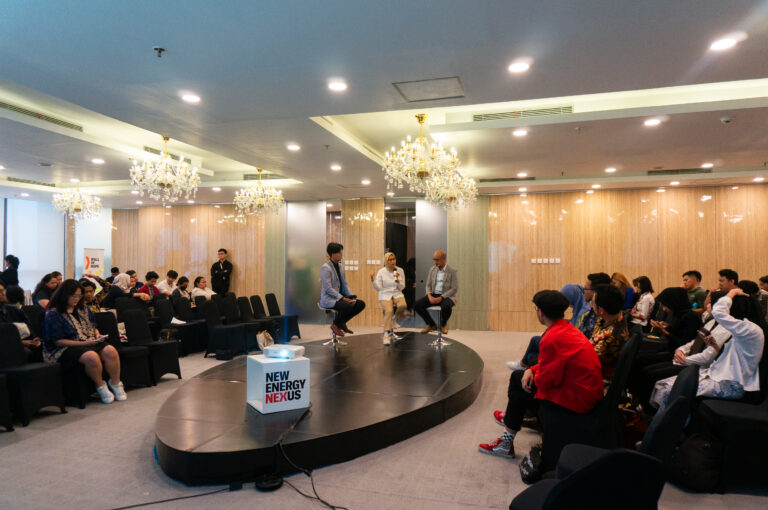
Participants of the [RE]Power Launch event listen to a discussion on Indonesia’s energy policy and the role of young people in shaping the country’s sustainable energy future.
The climate crisis is not some distant issue, but an immediate challenge that disproportionately affects us: the youth. We are the ones who will live with the consequences of today’s policy decisions. Therefore, we must understand how these energy policies are crafted and their potential impacts—both positive and negative. Youth is crucial in identifying new solutions to the challenges our world urgently needs to address.
This is why New Energy Nexus Indonesia initiated Indonesia’s first youth-driven energy policy hackathon, [RE]Power. The event is more than just a gathering; it provides a unique platform for young people to engage with complex issues, learn from experts, and collaborate on innovative solutions. It’s a space where youth can voice their concerns and actively participate in crafting policies that will shape their future. Beyond the event itself, policy hackathons symbolize a broader movement toward making youth participation in policy-making, especially in the energy sector, more meaningful.
Bringing together young people with diverse ideas
At the Policy Hackathon, we are bringing together a diverse group of individuals with varying perspectives and expertise, such as tech, engineering, law, and management, among others. This diversity is key for the group to think outside their own boxes, and be able to bring something new to the national energy policy front. When people from different backgrounds and skill sets collaborate, they are more likely to come up with creative solutions and see gaps that a more homogenous group might overlook. In the context of clean energy and climate policy, this means drawing on insights from young engineers, social scientists, environmentalists, and even those who simply have a passion for sustainability. Furthermore, diversity is essential to the development of inclusive policies that can address the multifaceted challenges of our time, without leaving anyone behind.
Moreover, these events create a sense of community and shared purpose. Young participants not only learn from experts but also from each other, building networks that can be leveraged for future initiatives. This collaborative spirit is crucial for fostering a culture of continuous improvement in clean energy policy.
Meaningful youth participation in learning policy and regulatory framework
One of the biggest challenges young people face in engaging with policy is the lack of transparency and access to information. Often, policy-making processes are not as transparent, making it difficult for the youth to understand how decisions are made and how such decisions can influence their lives. By contrast, policy hackathons provide a transparent and inclusive environment where young people can learn about policy frameworks, regulatory processes, and the complexities of governance. These offer hands-on experience that is invaluable for anyone looking to make a real impact.
Beyond the event itself, policy hackathons symbolize a broader movement toward making youth participation in policy-making more meaningful. Involving youth in these processes means we have to equip them with the knowledge and skills needed to be effective participants. Through educational programs, mentorship opportunities, and platforms for dialogue, we can empower young people, especially the ones who have just begun their careers and considering being involved in governance. They become not just passive recipients of policy decisions, but active shapers of them and preparing them to be future energy leaders.
At New Energy Nexus Indonesia, we believe that empowering youth with the knowledge and tools to engage in policy-making is essential for a sustainable future. This is why we’re hosting Indonesia’s first youth-driven policy hackathon—it’s an opportunity for young Indonesians to step up, put their minds into action, and lead the charge towards a cleaner, more sustainable future. By bringing together diverse groups, fostering innovation, and providing transparent, accessible information, we can ensure that today’s youth are not just prepared for the future—they are the ones deciding what it should look like.
